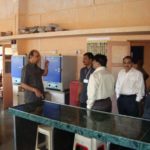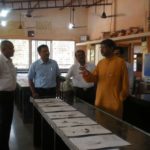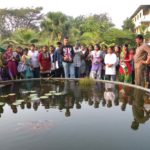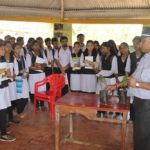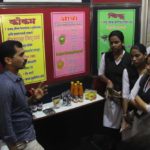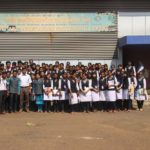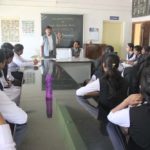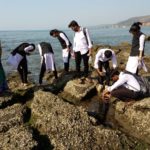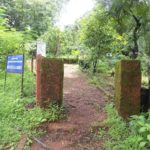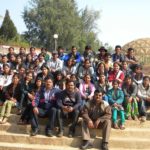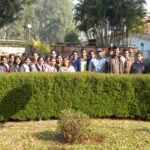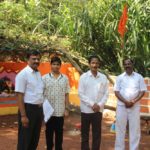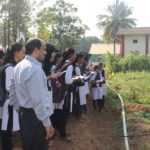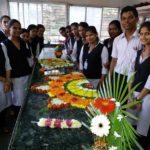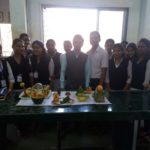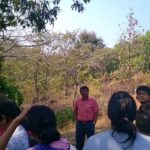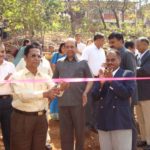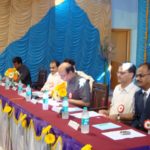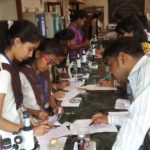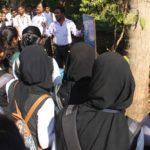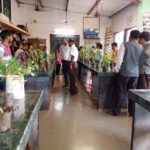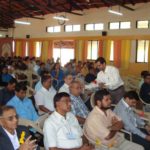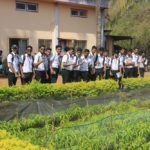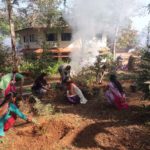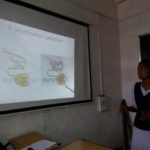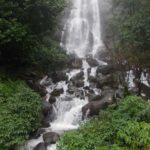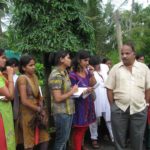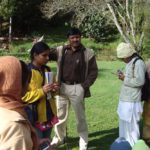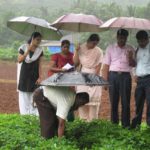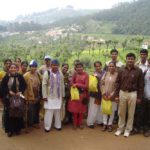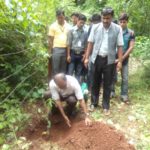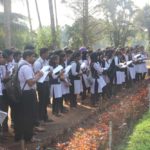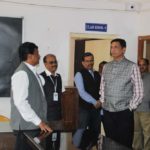About Department
Department of Environmental Science was established in the year 2019-20.It is one of multidisciplinary department of the college. Department provide conceptual, experimental knowledge of the subject and also develop skilled human resources.
Courses Taught
POST graduate Programme (Unaided)
M.Sc. (Four Units) 20 seats
| Semester | Course | Course Code | Weightage | Credit | Syllabus |
| I | Ecology and Ecosystem | PSEVS101 | 100 | 4 | |
| Biodiversity | PSEVS102 | 100 | 4 | ||
| Environment and natural resources | PSEVS103 | 100 | 4 | ||
| Practical | PSEVSP 104 | 50 | 2 | ||
| Environmental Geosciences (Elective) | PSEVS 105A
|
100 | 4 | ||
| Environmental Economics (Elective) | PSEVS 105B | 100 | 4 | ||
| Research Methodology | PSEVE 106 | 100 | 4 | ||
| II | Environmental Pollution | PSEVS 201 | 100 | 4 | |
| Pollution Control Technology | PSEVS 202 | 100 | 4 | ||
| Environmental Policies and Regulations | PSEVS 203 | 100 | 4 | ||
| Practical | PSEVSP 204 | 50 | 2 | ||
| Green technology | PSEVS 205A | 100 | 4 | ||
| Environmental Monitoring and Assessment | PSEVS 205B | 100 | 4 | ||
| On Job Training, Internship/Apprenticeship/Field Project | PSEVS 206 | 100 | 4 | ||
| III | Advanced Pollution And Control Technology | PSEVS 301 | 100 | 4 | |
| Instrumentation And Biostatistics | PSEVS 302 | 100 | 4 | ||
| Environmental Toxicology | PSEVS 303 | 100 | 4 | ||
| Industrial Hygiene And Chemical Safety | PSEVS 304 | 100 | 4 | ||
| IV | Eco Technology | PSEVS401 | 100 | 4 | |
| Environmental Biotechnology And Nanotechnology | PSEVS402 | 100 | 4 | ||
| Sustainable Management | PSEVS403 | 100 | 4 | ||
| Environmental Managment | PSEVS404 | 100 | 4 |
Programme Outcome-M.Sc.
PO1: Relate and apply fundamental knowledge of environmental science to factual world problem.
PO2: Analyse, identify and formulate actual services/ solutions/applications with environmental requirements.
PO3: Implement, and evaluate environmental – based solution applicable to public health, ecological safety, environmental management and sustainable development considerations.
PO4: Understand management and environmental principles run into need of environmental sectors.
Course Outcomes
Part -1 SEMESTER-I
Course: Ecology and Ecosystem
- The student will be able to discriminate the concept of principle and scope of ecology.
- The student will be able to predict the aspects of Biomes, Populations, Littoral Zones, Marine Environment and Dynamic Biogeography.
Course: Biodiversity
- The student will be able to discuss the concept of Biodiversity and its components.
- The student will be able to predict the values of biodiversity and its status.
Course: Environmental and Natural Resources
- The student will be able to describe about Earth, Man and Environment and also about Evolution of Environment.
- The student will be able to compare the relationship between landscape and climate and also about transfer of mass and energy across various interfaces.
Course: Environmental Geosciences (Elective)
- The student will be able to describe about origin and earth evolution and its different theories.
- The student will understand and describe geology of earth and also understand different structure of earth
Course: Environmental Economics (Elective)
- The student will able to understand relationship between Economy and the Environment.
- The student will able to describe economic growth its factor and market based instruments.
Course: Research Methodology
- The student will able describe research methodology and its different aspects how to do a research.
- The student will able to understand research design, data collection methods.
Part -1 Semester II
Course: Environmental Pollution
- The student will be able to discriminate sources and types of Pollution.
- The student will be able to compare sources, causes and effects of soil pollution and solid waste pollution.
Course: Pollution Control Technology
- The student will be able to distinguish between the concept of Sewage and waste water treatment systems.
- The student will be able to identify the methods to control air pollution in the environment.
Course: Environmental Policies and Regulations
- The student will be able to discuss the evolution of environmental policy at the national and international levels.
- The student will be able to predict the values of environmental movements in India.
Course: Green Technology (Elective)
- The student will be able to discriminate green chemistry, principle, concepts and tools of green technology.
- The student will be able to classify the concept of catalytic methods of green synthesis, different basic approaches of safer chemicals, and selection of Auxiliary substances and designing of biodegradable products.
Course: Environmental Monitoring and Assessment (Elective)
1.The student will be able to evaluate the information on methods and advantages of Environmental Monitoring.
2.The student will be able to gain information about Environmental Impact Assessment.
Course: OJT/FP (On Job Training, Internship/Apprenticeship/Field Project)
- The Students will able to do field work and survey.
- The students should also be encouraged to participate in the public lectures/ seminars/ workshops etc. on environment related issues.
Part -2 Semester III
Course: Advanced Pollution Control Technology
- The student will be able to analyse the water and waste water Pollution Control aspects.
- The student will be able to state air pollution control techniques.
Course: Instrumentation and Biostatistics
- The student will be able to restate the concepts environmental monitoring and Sampling of air water & soil.
- The student will be able to analyse the principle, instrumentation and environmental applications of NAA X Ray Fluorescence & Diffraction, Thermogravimetry etc.
Course: Environmental Toxicology
- The student will be able to relate fundamental concepts of Eco-toxicology and pressure of ecological factors on the effect of toxicity.
- The student will be able to examine Toxic substances in the environment, their sources, entry routes and impact on environment.
Course: Industrial Hygiene and Chemical Safety
- The student will be able to apply the monitoring and control measures of Work Environment.
- The student will be able to identify causes, impacts, management and control system of various disasters & hazards.
Part -2 Semester IV
Course: Eco technology
- The student will be able to apply the principles, concept, application of Eco technology and also appropriate technologies for rural technology.
- The student will be able to apply the concept of Clean Development Mechanism (CDM) to combat CC, Development of C-sequestration projects their modalities & procedures reducing emissions.
Course: Environmental Biotechnology and Nanotechnology
- The student will be able to discuss the basic concepts of DNA, RNA, Transgenic Plants, Bioremediation Technology and Phytoremediation.
- The student will be able to predict about Degradation of Xenobiotic compounds, Bio composting and Vermicomposting.
Course: Sustainable Management
- The student will be able to express national sustainable strategies in India.
- The student will be able to compare principles of sustainable development in business planning and management.
Course: Environmental Management
1.The student will be able examine about resources, wealth and concept of environmental management practices.
- The student will be able to explain the importance of ISO 14000 and also to gain information about procedure of Life Cycle Assessment.
Learning Resources of the Department
Post-graduate lab
Instrumentation lab
Faculty rooms with Wi-Fi Facility
Major instruments
Jar test apparatus
Ph meter
Lux meter
Sound level meter
Hygrometer
RESULTS
| Class | Year | Students Appeared | Students Passed | % Result | ‘O’ Grade | ‘A’ Grade | ‘B’ Grade | ‘C’ Grade |
| Msc II | 2020-21 | 03 | 03 | 100 | 03 | – | – | – |
| 2021-22 | 05 | 05 | 100 | 03 | 02 | – | – | |
| 2022-23 | 03 | 02 | 66.66 | 1 | – | 01 | – |
- Conduct of bridge lectures
- Remedial coaching for slow learners.
- Organizations of field visits and excursions.
- Conduct of Unit tests.
- Presence of Parent -Teacher system.
- Consultancy: –Visit to Environmental consultancy
- Linkages:
- Active participation of students and teachers in workshops ,seminars and conferences and presentation of research papers
- Students participation in various certificate course
- Enrollment of students in various short term course Etp and Stp design
- Webinar on career guidance in various aspect of Environmental Science
Department promote different ecofriendly activities like ecofriendly ganesh idol making, Ecofriendly products, also participate in green and environmental audit of the college.
Department also encourage other department’s to do different activities’ to looking after in environmental issues.
Chemistry Graduates & Post Graduate can enter a wide range of professions such as:
- Environmental safety officer
- Teaching
- Government Services
- Working in different environmental NGO, consulting agencies
- Entry in civil services through competitive Examinations (UPSC, MPSC etc.)
- Entrepreneur



